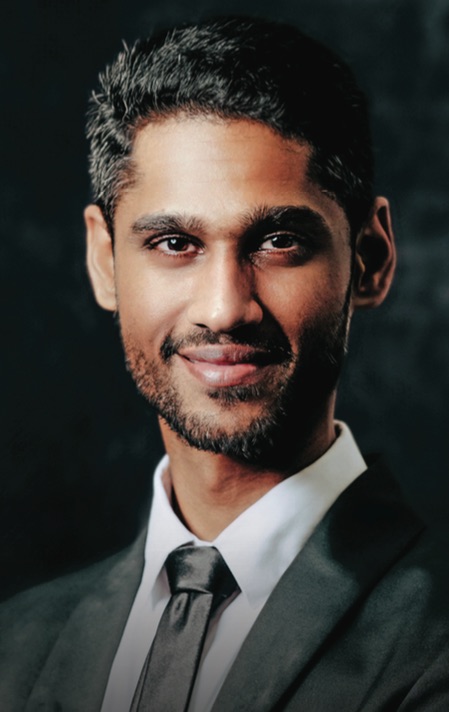Dr Craig Ramlal Appointed to UN AI Advisory Body
By David Riley

On Thursday October 26, United Nations Secretary-General António Guterres formally launched a High-Level Multistakeholder Advisory Body on Artificial Intelligence. The body’s goal is to foster a globally inclusive approach to ensuring that AI technologies are harnessed responsibly, maximising their potential to supercharge efforts to achieve a more sustainable world, while minimising potential associated risks and inequalities.
Amidst a fiercely competitive selection process, drawing over 2,000 candidates from 128 countries, UWI St Augustine’s very own Dr Craig Ramlal secured his place among the elite group of 38 AI experts.
At 35, Dr Ramlal boasts an impressive academic and research résumé. On the St Augustine campus alone, he is a distinguished lecturer at the Faculty of Engineering’s (FENG) Department of Electrical and Computer Engineering (DECE), the Head of the Control Systems Group at DECE, the Coordinator for the Postgraduate Studies and Research at the department and the Principal Investigator of the Intelligent Systems Lab – a research lab which focuses on developing machine learning, intelligent control algorithms, and AI-enabled software.
On being appointed to the Secretary General’s advisory body, Dr Ramlal couldn’t hide his elation.
“I’m very honoured, very humbled and very happy to participate in this forum where everyone is at the cutting edge of their field. When any member or the body speaks, every sentence is weighted by years of experience,” he says, speaking of his early interactions with other AI luminaries on the advisory body.
Dr Ramlal’s happiness with his selection is, however, not limited to his pride in his personal accomplishment. He is also pleased about the opportunity to represent the Group of Latin America and the Caribbean (GRULAC), contemporarily known as the Global Southwest, during the panel’s deliberations. For Dr Ramlal, diversity of ideas and inputs is an imperative stipulation for building better AI systems which can serve the global good, as opposed to only limited corporate interests in more developed countries.
At the top of his wish list of accomplishments for the UN advisory body is to make governance recommendations which can “reduce the disparities between those who can create and use AI and those who don’t have the economic capacity to do so”. He says the challenge lies in the fact that, because of disparities in funding, many developing countries are “currently not able to create AI systems that would benefit their own countries”, while developed nations are simultaneously “moving very quickly to develop better and better systems”.
This is a complex problem when considering large language models (LLM). LLM – a type of AI algorithm that uses deep learning techniques and enormously large data sets to interpret, summarise, generate and predict new content – are one form of generative AI that are specifically designed to generate text-based content. As he explains, large corporations who are at the forefront of developing the most powerful AI systems have used LLMs which, they admit, are flawed because they contain cultural biases due to the homogenous datasets they are derived from.
On the other hand, while Dr Ramlal believes that there is a genuine desire to obtain more diverse data sets to reduce bias, despite the Caribbean’s diversity, “our data sets are extremely minimal. It's difficult to create, and there is a lack of incentives to create datasets within the Caribbean.”
Notwithstanding this challenge, he sees tremendous worth in governments, and industry and academic players in the Global Southwest investing heavily in the development of safe AI technologies.
Dr Ramlal also believes that there is no need for Caribbean nations to attempt to compete with the OpenAIs of this world. “Our focus should really be strengthening our own niche industries with these AI systems,” he argues. There is scope for AI technologies to power the improvements in the agricultural sector in a way that can positively affect climate change, as well as in other industries such as tourism, oil and gas, and medicine. In order to effect these changes, Dr Ramlal sees three approaches as key:
For his part, Dr Ramlal is already at the forefront of his own AI revolution which he heads off in his role as lecturer, researcher and coordinator at UWI St Augustine. He jovially, but perhaps accurately, describes himself as “probably the biggest person in the Global Southwest to push students to study AI!”
Additionally, as a major proponent of up-skilling the regional population, Dr Ramlal has been a driving force behind several Continuing Professional Education (CPE) courses which are now being offered at the St Augustine campus. They include ‘Introduction to AI’, ‘Statistics in AI’, ‘Practical Machine and Deep Learning’ and ‘Pre Processing for Machine Learning and Data Analysis’. There are limited academic barriers to entry for pursuing these courses, which are designed to empower everyday people with general knowledge of artificial intelligence technologies, as well as to introduce the populace to new tools which can bolster their productivity.
In the 2024/2025 academic year, UWI St Augustine will launch its Master of Applied Science in Artificial Intelligence and PhD in Artificial Intelligence degree programmes.
The UN’s High-Level Multistakeholder Advisory Body on Artificial Intelligence will move swiftly to present its first preliminary recommendations to the Secretary-General by the end of this year. Dr Ramlal’s appointment not only recognises his exceptional expertise in the field, but it also positions him at the forefront of a global movement to harness AI responsibly and inclusively, shaping a better future for humanity – a movement which he has steadily been working to ensure that his compatriots from the Caribbean and Global Southwest benefit from.